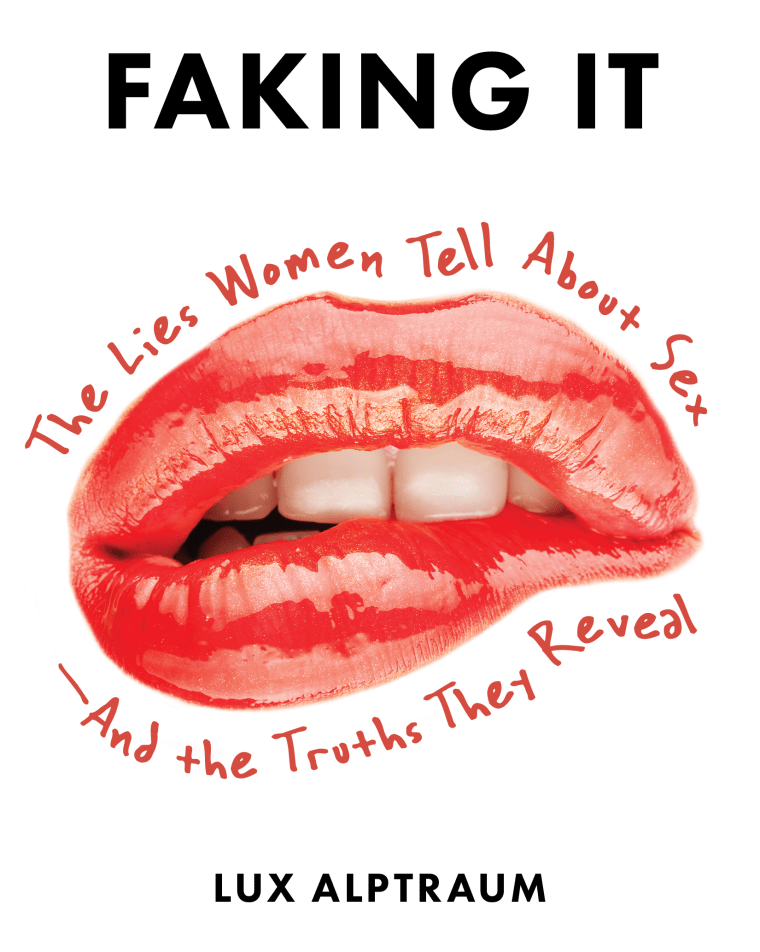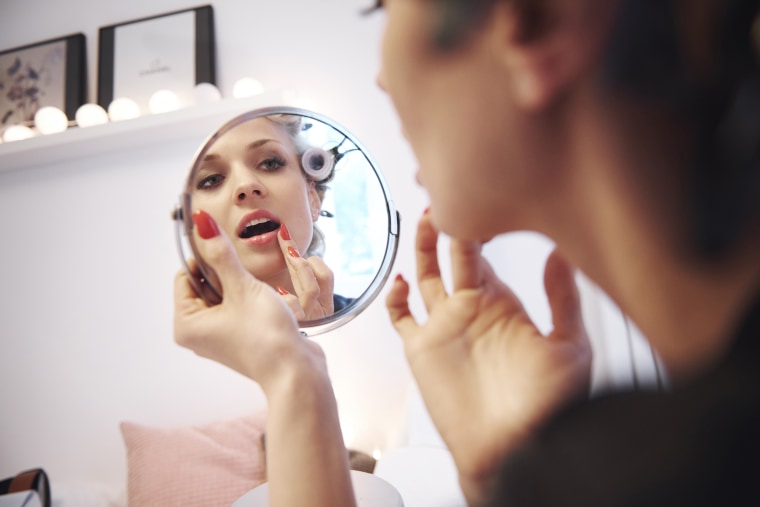For all the benefits secured by women who deftly wield a makeup brush or wig or shapewear, there’s a danger that comes with being too good at transforming one’s self into the ideal image of female beauty.
In January 2015, makeup artist Andreigha Wazny posted two photos of her friend Ashley VanPevenage, one showing VanPevenage without makeup, the next showing her with a fully made‑up, high-glamour face. The transformation is stark: VanPevenage’s skin goes from blemished to flawless, her nose appears to change shape, her eyebrows darken and fill out, and her eyes — now framed by dark, smoky eye shadow and lustrous black lashes — seem brighter and more radiant.
To anyone familiar with the transformative power of makeup, there was nothing particularly surprising about these before and after shots. But when they went viral, launching out of the orbit of makeup social media and into the mainstream internet, things took a dark turn.

A few weeks after Wazny posted the photos, a Twitter user reposted them with the caption “The reason why you gotta take a bitch swimming on the first date,” an outing that would presumably wash away a woman’s makeup and reveal her “true” face. (The phrase, it should be noted, did not originate with this user, but seemed to explode in popularity subsequent to this exchange.)
The implication of the phrase, which eventually turned into a meme itself, was clear: Women are trying to deceive men, using the various tricks of the beauty industry to lure unsuspecting paramours into relationships. A man who isn’t careful — who takes the object of his affection at face value, so to speak — can easily wind up saddled to a woman who’s merely faking the attractive exterior that drew him to her in the first place. Women, it’s implied, are inherently deceitful, and those who manage to secure through makeup what they were denied by nature deserve to be revealed.
For women, the world of beauty often presents a difficult, if not outright impossible, situation to navigate. Eschew cosmetics entirely, and you’ll likely be scorned for not caring enough about your appearance; put too much faith in the power of physical transformation, and suddenly you’re a grotesque caricature of vanity as well as a portrait of deceit.
There is, in theory, an optimal amount of effort that deftly balances looking attractive with not caring too much about your appearance, but where that perfect mix is can be pretty hard to pinpoint — and where, exactly, it lies depends a lot on what sort of looks you were born with.
“Take a bitch swimming on the first date” may be one of the more vicious male commentaries on female makeup use, but it’s hardly the only one. Men have long declared themselves the arbiters of acceptable application of makeup, and the internet is filled with anti-makeup screeds that use photos to illustrate the argument that women who are unadorned and au naturel look far better than “cakefaces” who bury their skin under layers of product.
Why the animosity toward makeup? Some of it is undoubtedly due to a suspicion that women who wear makeup are trying to hide something (presumably a hideous appearance), but there’s also a vague sense that women who eschew cosmetics are of an entirely different — and more desirable — breed than their bedecked peers. A "Men’s Health" piece offering itself up as “an ode to natural beauty” presents a collection of reasons why bare faces are better; for readers of "Men’s Health" it’s clear that makeup isn’t just makeup.
According to the experts cited in the piece, going makeup-free makes women seem more confident, more innocent, and more “primal” and sexy (how a lack of makeup simultaneously makes women seem less sexually experienced and more “primal” is a mystery to me), as well as suggesting that they’re outdoorsy, approachable, and down‑to‑earth. The general sentiment — which pervades virtually all arguments against makeup — seems to be that women who eschew beauty culture are more authentic and, as a result, inherently better partners.
Which, I suppose, makes it that much more ironic that the photos chosen to illustrate this celebration of going makeup-free are all stock images secured from Thinkstock — photos that, unsurprisingly, are definitely showcasing women who are wearing makeup. This isn’t just a mistake on the part of "Men’s Health"; it’s a common trait of articles claiming to celebrate going makeup-free.
If anything, men who try to use photos to “prove” they hate makeup are more likely to offer up a demonstration of how little they know about how makeup works and what role it plays in many women’s daily routines. The “makeup-free” women celebrated by men are rarely truly makeup-free; rather, they’re either wearing sparse amounts of carefully applied product or employing the oxymoronic cosmetic strategy known as “natural makeup.”
For those not steeped in the lingo of fashion magazines, practitioners of the natural makeup look use cosmetics to create a visage perhaps best described as “you, but better.” There’s a great deal of emphasis placed on making the skin look flawless; blush, subtle eye shadow, muted lipstick, and mascara all come into play to help make facial features pop and add depth and definition to features that might not stand out without cosmetic assistance. It’s a look that’s supposed to suggest effortless beauty, but as anyone who’s actually put it into practice can tell you, it often takes more effort than a heavier, obviously made‑up look.
Devoting the better part of an hour to making yourself look as if you’re not wearing makeup at all may seem like a counterproductive task, but for women with acne scars or eye bags or unwanted facial hair, it can be a way to feel pretty without looking overly made‑up. When I ask Baze Mpinja, a former beauty editor for "Glamour," for her thoughts on the look, she offers another possibility for its popularity. Natural makeup, she tells me, allows women to conform to conventional beauty standards without advertising the fact that they’re trying.
“You’re supposed to hide the work that goes into looking pretty,” Mpinja notes. “If you admit how much effort you’re putting in, it begs the question why.” Specifically it suggests that you’re vain or desperate for male attention, undesirable qualities even within a society that teaches women to measure their worth by the amount of attention men give them for their appearances.
But let’s be clear about something: Looking pretty, by American beauty standards, takes a lot of effort — no matter how genetically gifted you may be. Even if you’re blessed with clear skin and an even complexion, thick, healthy hair, long, dark eyelashes a stunning bone structure and enviably pouty lips, to be considered truly beautiful requires adherence to all manner of painful, time-consuming rituals designed to remake the female body into an artificially soft, smooth, and hairless “ideal.”
And if you’re not white, it’s that much harder: The faces and features most readily celebrated in our culture all hew to a Eurocentric beauty standard.
What kind of work goes into being pretty? The first episode of the CW’s "Crazy Ex‑Girlfriend" offers a glimpse into some of the complicated, and at times grotesque, practices that have been normalized by American beauty culture. As Rachel Bloom performs “The Sexy Getting Ready Song,” an R & B tribute to the work women put into physically prepping themselves for a romantic encounter, a variety of ablutions are depicted on-screen. Among those that make an appearance are eyebrow plucking, nose hair plucking, heel buffing, donning Spanx, exfoliating facial skin, curling eyelashes, curling hair, bleaching facial hair, and — in a scene that ends with a shot of blood spattered on the bathroom wall —self-administered waxing of the hair inside her buttocks.
Though the beauty rituals are played for comic effect, they’re very much rooted in reality; indeed, some women’s cosmetic routines are far more punishing than what makes it into the song.
So much about the ideal women are taught to aspire to — the gravity-defying yet ample breasts, the silky smooth skin, the muscular yet buxom body — is an artificial construct, effortlessly available to only a tiny minority of women (if to any of us at all); for the rest of us, achieving the look takes a staggering amount of work. Any woman who’s tried to be pretty knows exactly how much time, effort, and pain are required to adhere to beauty standards.
Yet even as we all know what goes on behind the scenes, we’re still playing a perverse little game that asks us to obscure the work, to publicly be in denial about the effort it takes to be an attractive woman. (And, to some degree, to obscure the work it takes to be a woman, period. An essay penned by Jessica Leigh Hester for the Atlantic argues that concealer, foundation and other makeup tricks used to make women look less tired are, in effect, preventing the rest of the world from seeing how tiring it is to live in this world as a woman.)
It’s not enough to convincingly present a flawlessly attractive exterior; we must do all that while professing to the world that it was all effortless, and that — to paraphrase Beyoncé — we simply woke up this way.
But to deny the labor that goes into female beauty is to prop up the lie that it’s “natural” to have a body that is anything but, that the aggressive beauty standards we’re judged by are not just acceptable but potentially even fair. When body hair is treated as an invading army to be battled and defeated rather than a simple secondary sex characteristic, the phrase “natural beauty” ceases to have meaning.
We’ve bought into the notion that it’s not merely desirable but downright mandatory to invest time and money and effort into maintaining this charade of what “real women” look like — even as that charade reinforces some of the most noxious aspects of American society.
Excerpted from "Faking It: The Lies Women Tell about Sex — And the Truths They Reveal" by Lux Alptraum. Copyright © 2018. Available from Seal Press, an imprint of Perseus Books, LLC, a subsidiary of Hachette Book Group, Inc.




